EFPP Book Series
EFPP e-journal Review
EFPP Research
EFPP Research Award
EFPP Social Applications
EFPP Book Series
Browse through the EFPP Book Series published by Routledge
The EFPP
Monograph Series

A Psychoanalytic Exploration of Social Trauma The Inner Worlds of Outer Realities
Cristina Calarasanu, Ulrich Schultz-Venrath & Hansjorg Messner
December 30, 2022
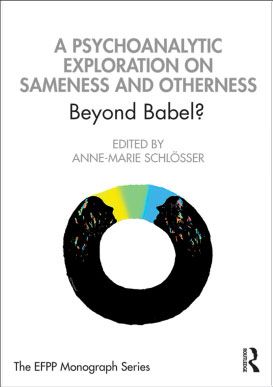
A Psychoanalytic Exploration On Sameness and Otherness
Anne-Marie Schlösser
December 24, 2019

A Psychoanalytic and Socio-Cultural Exploration of a Continent: Europe on the Couch
Anna Zajenkowska, Uri Levin
October 29, 2019

A Bridge Over Troubled Water: Conflicts and Reconciliation in Groups and Society
Gila Ofer
July 31, 2017

Siblings: Envy and Rivalry, Coexistence and Concern
Beata Maciejewska, Katarzyna Skrzypek, Zuzanna Stadnicka-Dmitriew
May 09, 2014
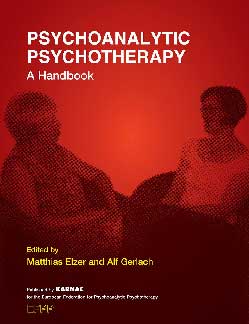
Psychoanalytic Psychotherapy A Handbook
Matthias Elzer & Alf Gerlach
March 17, 2014
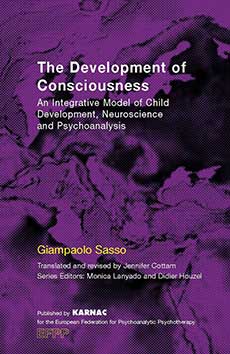
The Development of Consciousness An Integrative Model of Child Development, Neuroscience and Psychoanalysis
Giampaolo Sasso
December 31, 2007
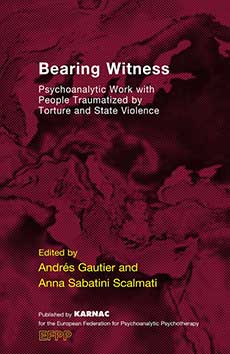
Bearing Witness Psychoanalytic Work with People Traumatised by Torture and State Violence
Andres Gautier & Anna Sabatini Scalmati
December 31, 2010

Play and Power
Liselotte Grunbaum & Karen Vibeke Mortensen
December 31, 2010

Assessing Change in Psychoanalytic Psychotherapy of Children and Adolescents Today’s Challenge
Judith Trowell & John Tsiantis
December 31, 2010
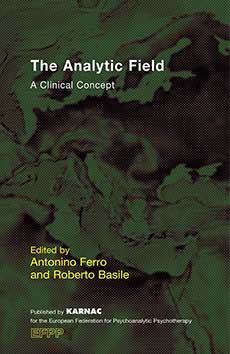
The Analytic Field A Clinical Concept
Roberto Basile & Antonino Ferro
December 31, 2009
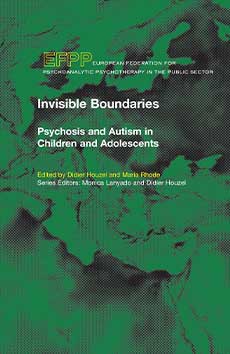
Invisible Boundaries Psychosis and Autism in Children and Adolescents
Didier Houzel & Maria Rhode
December 31, 2006
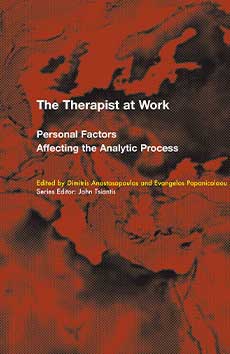
The Therapist at Work Personal Factors Affecting the Analytic Process
Dimitris Anastasopoulos, Christos Ioannidis, Judy Kantrowitz, Joachim Küchenhoff, Gila Ofer, Evangelos Papanicolaou, Maria Ponsi, Claude Smadja, Imre Szecsody & Gisela Zeller Steinbrich
December 31, 2004
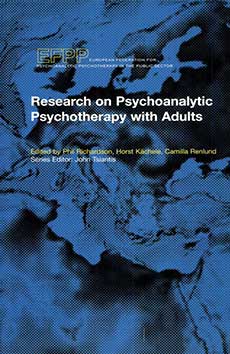
Research on Psychoanalytic Psychotherapy with Adults
Horst Kachele, Camilla Renlund & Phil Richardson
December 31, 2004

Psychoanalysis and Psychotherapy The Controversies and the Future
Serge Frisch, Jean-Marie Gauthier & R. D. Hinshelwood
December 31, 2001

Work with Parents Psychoanalytic Psychotherapy with Children and Adolescents
Siv Boalt Boethious, Birgit Hallerfors, Ann Horne & John Tsiantis
December 31, 2010

Psychoanalytic Psychotherapy of the Severely Disturbed Adolescent
Dimitris Anastasopoulos, Effie Lignos & Margot Waddell
December 31, 1999
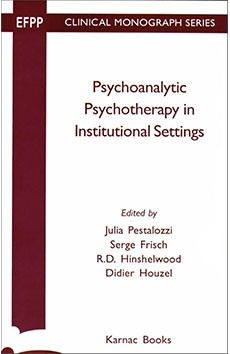
Psychoanalytic Psychotherapy in Institutional Settings
Serge Frisch, R. D. Hinshelwood, Didier Houzel & Julia Pestalozzi
December 31, 1998

Supervision and its Vicissitudes
Brian V. Martindale, Margareta Morner, Maria E. Rodriguez & Jean-Pierre Vidit
December 31, 1997
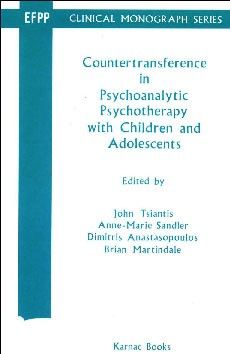
Countertransference in Psychoanalytic Psychotherapy with Children and Adolescents
Dimitris Anastasopoulos, Brian V. Martindale, Anne-Marie Sandler & John Tsiantis
December 31, 1997
A Psychoanalytic Exploration of Social Trauma presents a thorough introduction to social trauma from a range of perspectives, exploring several key themes, specific causes and symptoms and clinical interventions.
With chapters from a diverse range of authors, the book considers social trauma as it relates to stories and history, group identity, the consulting room, migration, and post-traumatic conditions. These topics are explored via a range of frames, including individual therapy, group analysis, social dream matrix, large groups, case studies, narrative recollections, and cinematographic expression. The book also considers the implications of new technology in causing and treating social trauma.
A Psychoanalytic Exploration of Social Trauma will be of great interest to psychoanalytic psychotherapists in practice and in training, psychoanalysts, and psychoanalytically informed professionals working with trauma.
Anne-Marie Schlösser
is a psychologist and training and supervising analyst with the IPA, DPG, and DGPT, working in private practice after many years at the Department of Medical Psychology at the University of Goettingen. She is a member of German committees for the development of psychotherapy, an expert for psychoanalytic treatment in the German Health Services, past president of the DGPT and EFPP, and has offered training in psychoanalytic psychotherapy in Shanghai. She is Editor-in-Chief of the EFPP Book Series published by Routledge.
In dialogue with the most famous myth for the origin of different languages – The Tower of Babel – A Psychoanalytic Exploration on Sameness and Otherness: Beyond Babel? provides a series of timely reflections on the themes of sameness and otherness from a contemporary psychoanalytic perspective. How are we dealing with communication and its difficulties, the confusion of tongues and loss of common ground within a European context today? Can we move beyond Babel?
Confusion and feared loss of shared values and identity are a major part of the daily work of psychoanalytic psychotherapists.Bringing together an international range psychoanalytic practitioners and researchers, the book is divided into six parts and covers an array of resonant topics, including: language and translation; cultural identity; families and children; the cyber world; the psychotherapeutic process; and migration. Whereas the quest for unity, which underpins the myth of Babel, leads to mystification, simplification, and the exclusion of people or things, multilingual communities necessitate mutual understanding through dialogue. This book examines those factors that further or threaten communication, aiming not to reduce, but to gain complexity. It suggests that diversification enriches communication and that, by relating to others, we can create something new.
As opposed to cultural and linguistic homogeneity, Babel is not only a metaphor for mangled communication, alienation, and distraction, it is also about the acceptance or rejection of differences between self and other. This book will be of great interest to psychoanalytic psychotherapists and researchers from a wide variety of backgrounds.
Anna Zajenkowska, PhD.
is Adjunct Professor and manages the Department of Social Psychology and Doctoral School of the Maria Grzegorzewska Pedagogical University in Warsaw. She is a trained group analyst and board member of the IGAR (Institute of Group Analysis RASZTÓW). She has previously studied and worked in corporations in Austria, Korea and Poland.
Uri Levin
is a clinical psychologist, group analyst and organizational consultant. He is a board member of the EFPP (European Federation of Psychoanalytic Psychotherapy). He teaches at the Tel Aviv University and supervises both in individual and group settings. He works mainly at his private practice in Tel Aviv with adults and adolescents.
ANNA ZAJENKOWSKA, URI LEVIN
A Psychoanalytic and Socio-Cultural Exploration of a Continent: Europe on the Couch
OCTOBER 29, 2019
This important book gathers a set of influential international contributors with psychoanalytic and group analytic knowledge to provide a wide-ranging critical analysis of the present state of Europe.
Europe is facing huge challenges: waves of immigrants are reshaping its identity and testing its tolerance; Brexit is a destabilizing factor and its outcomes are not yet clear; economic crises continue to threaten; the resurgence of nationalism is threatening an open-borders one-continent ideology. This book tackles some of these challenges. Divided into two parts, the first analyses the current social, political, cultural and economic trends in Europe using psychoanalytic and group analytic concepts, while the second concentrates on existing applications of psychoanalytic and group analytic concepts to help manage national and international change in individual countries as well as on the continent as a whole, including groups for German, Ukrainian and Russian participants; groups organised in Serbia in order to overcome the recent, traumatic past; and the “Sandwich model”, developed to enhance communication in situations of conflict, trauma and blocked communication. When we feel threatened, we cling to our in-group and its members. We want to think the same and be the same as our neighbors, but this group illusion of homogeneity conceals the fact that we are different. While homogeneity offers stability, it is diversity that offers freedom.
This book will be of great interest to researchers on the present state of Europe from across a range of different disciplines, from psychoanalysis to politics, sociology, economics and international relations.
Vamik Volkan, Robi Friedman, John Schlapobersky, Haim Weinberg, and Michael Bucholz, with a foreword by Earl Hopper and an introduction by Gila Ofer
A Bridge Over Troubled Water: Conflicts and Reconciliation in Groups and Society
July 31, 2017
This book is a compilation of papers by different authors, among them Vamik Volkan, Robi Friedman, John Schlapobersky, Haim Weinberg, and Michael Bucholz, with a foreword by Earl Hopper and an introduction by Gila Ofer, both editor and contributor.
While most of the writers are group analysts, working in the tradition of Foulkes, several others come from different though complementary perspectives, enriching the theoretical basis of the research. So, there are perspectives, inter alia, from Bion and Cortesao.
The writers represent different countries and cultures, focusing on problems that are endemic to their own localities that yet have a wider and deeper resonance. We are introduced to conflict and division in Bedouin society, the Roma people living in Greece, citizens’ reflective communities in Serbia, continuing territorial and ideological differences in Israel and the middle-east, and tensions of difference in the psychoanalytic community itself.
Beata Maciejewska, Katarzyna Skrzypek & Zuzanna Stadnicka-Dmitriew
Siblings
Envy and Rivalry, Coexistence and Concern
May 9, 2014
This book compiles papers presented at the European Federation of Psychoanalytic Psychotherapy’s 2011 Conference, which attempts to find the place of sibling relationships in psychoanalytic practice. It examines the rivalry and envy between siblings, and the coexistence and concern for each other.
Table of Contents
Series Editor’s Preface — Foreword — Introduction — Sibling: Intruder or Newcomer — Sibling rivalry: psychoanalytic aspects and institutional implications — Siblings in psychotherapy: a report from a preliminary psychoanalytic research project — Therapeutic group—almost like a family: a few comments on siblings — The intransience of the sibling bond: a relational and family systems view — Moses, Aaron, Miriam: integrative sibling relation — Growing up with a Sick or Disabled Sibling — The disabled child’s siblings and parents: dealing with the impact of the birth of a disabled sibling: a case study — The disabled child’s siblings and parents: the ghost sibling — The disabled child’s siblings and parents: their predicaments — A family under a microscope: about the influence of family ties through DNA — Loss of a Sibling — The transgenerational pattern of trauma transmission — A sister is being murdered — Casting a long shadow: implications of sibling loss — Transference and Countertransference Related to Siblinghood — The actual twin and the imaginary subject — The lost twin: on various types of reaction to having a twin sibling — Experiences with siblings in early childhood: specific forms of transference and countertransference in therapeutic processes — Lateral vs. Vertical: The Intertwining of the Two Perspectives — Envy, jealousy, love, and generosity in sibling relations: the impact of sibling relations on future family relations — The fraternal complex in the Under Five Service — Ghosts in sibling rivalry — “We are unbeatable.” The relation between siblings seen as an opportunity or as a retreat: talking about the Oedipus complex—is that old-fashioned? — The psychotherapists’ relation with their own siblings as a factor shaping the therapeutic relation.
A Psychoanalytic Approach
April 2, 2014
This book is a collection of essays by eminent scholars on the psychoanalysis of couples and families and provides a wide ranging and articulated picture of the current situation in Europe.
The reader will find various psychoanalytical models applied in it: from object relations theory to group analysis to the theory of links, encountering the lively and rich French, Italian, and British schools at work in different settings.
March 17, 2014
This book is an introductory textbook for psychiatrists and psychologists who use psychotherapy in a psychoanalytic attitude in their daily professional work with patients.
It was developed from the experiences of German psychoanalysts teaching in China between 1997 and 2010. The idea of a basic textbook was developed in order to facilitate the teaching and learning process.
Book Description
This book provides a complete and fundamental overview, from a psychoanalytical point of view, on theoretical and clinical aspects of psychodynamic or psychoanalytic psychotherapy. It includes the theory of the human mind, psychic development, psychic conflicts, trauma, and dreams.
Table of Contents
Giampaolo Sasso
The Development of Consciousness
An Integrative Model of Child Development, Neuroscience and Psychoanalysis
December 31, 2007
This book comes as a landmark. Sasso’s work is extremely valuable for everybody wanting to think over possible points of convergence between psychoanalysis and neuroscience.
This well-documented text addresses the complexity of this field and suggests a new model of brain growth that takes into account the psychic work of both the child and his/her carers. It touches especially upon the problems of the development of consciousness and the origins of language.’
Bernard Golse
Table of Contents
‘In their discussion of torture, the contributors to this book write of what its victims cannot put into words and the work that has to be done with them to that end.
Working with a victim’s account of a traumatic experience goes much further than any debriefing technique would have us believe—above all, victims need someone to listen carefully to what they have to say; that person will be the first to offer a refuge for the pain of those who have no internal “shelter” of their own.’ René Kaës, From the Foreword
Table of Contents
The power of play, so central to psychoanalytic theory and practice, is conjoined to the social psychological or socio-politically coloured concept of power, giving rise to many fruitful discussions of how these concepts manifest themselves in clinical work with children, groups and adults.
The inspiration for this book was the 3-section EFPP conference in Copenhagen in May 2007 with the main theme “Play and Power”.
The power of play, so central to psychoanalytic theory and practice, is conjoined to the social psychological or socio-politically coloured concept of power, giving rise to many fruitful discussions of how these concepts manifest themselves in clinical work with children, groups and adults. The inspiration for this book was the 3-section EFPP conference in Copenhagen in May 2007 with the main theme “Play and Power“. At the conference and in the book, this theme is presented both inside and outside the therapeutic space. It is amply illustrated in clinical cases from individual psychotherapies with children and adults and from group analysis. Most of the examples are with hateful or resigned children and adults who have been exposed to extremely damaging or unhelpful environments, and who demonstrate convincingly some of the devastating consequences that abuse of power in the real world may have. Play and power are also explored in the broader context of the community, however.
Working with children, young people and their families has been so demanding and interesting that we have failed to give priority to demonstrating that what we do is helpful. This applies even more to those of us working using psychoanalytic theories.
This book draws together work by leading clinical researchers from across Europe who have taken up this challenge and have undertaken clinical research to look at the effectiveness of psychoanalytic interventions.
Book Description
This book draws together work from across Europe by leading clinical researchers who have been looking into the effectiveness of psychoanalytic interventions. They are mostly time limited, brief, non-intensive ways of working so are applicable in many settings and can therefore be generalised to other clinical teams. The populations worked with are diverse and often present mainstream services with refractory clinical problems, so an applied psychoanalytic approach is well worth trying, given the evidence presented in this volume. There is in addition an excellent theoretical chapter on the issues of such clinical research from Stephen Shirk which merits consideration by those wishing to evaluate their own work. This book is an important contribution to services for child and adolescent mental health. With increasing family distress and concerns about inadequate parenting, family breakdown and troublesome adolescents, it will help to ensure the full menu of interventions is retained in these times of financial restraint.
Table of Contents
Roberto Basile & Antonino Ferro
The Analytic Field
A Clinical Concept
December 31, 2009
Until now, no book has ever attempted to compare and contrast contributions on field theory and at the same time to explore its clinical and technical implications.
This volume is intended to link together, for the first time, many of these writings and to provide wide-ranging survey of the subject – for it is our contention that a theory of the field in various of its loci can also be inhabited by different theories.
A particular aim of this book is to present not only theoretical discussions of field theory, but also contributions on clinical work and technique. For this reason we have given preference to articles with a substantial clinical component which exemplify specific underlying technical theory. In the Babel of psychoanalytic languages, clinical practice is in our view the most effective way of comparing psychoanalytic models.
This book will stimulate readers to cross borders: between theory and practice, between research and everyday therapy, between out-patient and in-patient psychotherapy, between the view of ones own, the known and the culturally foreign. Yet it is only with an awareness of these borders, an acknowledgement and respect of them, that it will be possible to proceed towards integrating differences, where this makes sense and appears necessary.
Table of Contents
Didier Houzel & Maria Rhode
Invisible Boundaries
Psychosis and Autism in Children and Adolescents
December 31, 2006
This volume is an outcome of the European Federation for Psychoanalytic Psychotherapy conference on psychotic and autistic conditions in childhood and adolescence, encouraging the cross-fertilization of psychoanalytic practice and theory across the international boundaries in Europe.
Table of Contents
Dimitris Anastasopoulos, Christos Ioannidis, Judy Kantrowitz, Joachim Küchenhoff, Gila Ofer, Evangelos Papanicolaou, Maria Ponsi, Claude Smadja, Imre Szecsody & Gisela Zeller Steinbrich
The Therapist at Work
Personal Factors Affecting the Analytic Process
December 31, 2004
Dimitris Anastasopoulos and Evangelos Papanicolaou have gathered together a distinguished group of contributors to focus on the therapist’s participation in therapy and the influence of personal factors on the therapeutic relationship. The majority of the papers grew out of the proceedings of the fourth EFPP Congress of the Adults Section in 2000 and explore the therapist-patient relationship with the emphasis on the influence of the therapist as opposed to that of the patient. Topics discussed in this collection include the impact of the patient on the analyst, how the analyst’s clinical theory and personal philosophy affect the analytic process, the effect of the therapist’s dreams on the therapeutic process, the psychoanalyst’s influence on the collaborative process, and intersubjective phenomena and emotional exchange in the psychoanalytic process. Certain papers focus mainly on theory while others are more clinically-oriented. This volume presents an overview of historic and current thinking and aims to generate yet more discussion on this evolving and important issue. It will be of interest to practicing and training psychotherapists.
Table of Contents
Horst Kachele (Germany) MD
is a Specialist in Psychotherapeutic Medicine and a psychoanalyst (IPA). He is full professor and Chair of the Department of Psychotherapy and Psychosomatic Medicine at Ulm University; he also directs the Centre for Psychotherapy Research in Stuttgart. He is a member of the Society for Psychotherapy Research.
Camilla Renlund (Finland)
Adult Psychiatrist and a member of the research team of the Helsinki Psychotherapy Study, a randomized psychotherapy outcome study. She also works as a psychoanalyst in private practice in Helsinki and is an Associate Member of the Finnish Psycho-Analytical Society.
December 31, 2004
Contributors
Synopsis
EFPP Monograph Series
‘This is a pioneering volume of work in progress. It is clear from the variety of findings reported in this stimulating volume that many of the traditional ideas concerning psychoanalytic psychotherapy will need to be revised.’ Peter Fonagy from the Foreword PHIL RICHARDSON (UK) is a clinical psychologist and qualified as a psychoanalyst with the British Psychoanalytical Society. He is Professor of Clinical Psychology at the University of Essex and Head of Psychology at the Tavistock & Portman NHS Trust where he is also Director of the Psychotherapy Evaluation Research Unit.
Table of Contents
Serge Frisch, Jean-Marie Gauthier & R. D. Hinshelwood
Psychoanalysis and Psychotherapy
The Controversies and the Future
December 31, 2001
Contributors
Volume 6, 2001, Soft Cover, 154 pages
In this, the sixth volume in the highly successful monograph series produced under the auspices of the European Federation for Psychoanalytic Psychotherapy in the Public Health Services (EFPP), the clear distinctions which once existed between psychoanalysis proper and the psychoanalytic psychotherapies are strongly debated and reassessed in the light of contemporary paradigm shifts in treatment modalities.
“…Certainties about the distinct enough compartmentalizations of psychoanalysis and psychoanalytic psychotherapies no longer exist. The borders between them are now blurred, and they shift constantly, depending on one’s vantage point and one’s theoretical predelictions…This range of uncertainty and contention is clearly illustrated, and very sharply, in the present volume.”
– Robert S. Wallerstein from his foreword.
Siv Boalt Boethious, Birgit Hallerfors, Ann Horne & John Tsiantis
Work with Parents
Psychoanalytic Psychotherapy with Children and Adolescents
December 31, 2010
Editorial Committee
Contributors
Synopsis
EFPP Monograph Series
“The decision to publish a volume on work with parents in this EFPP monograph series is much to be welcomed. It will go some way to remedy the relative neglect of systemic thinking about this important area of clinical practice and to mount an intellectual challenge to more systemically based family interventions. The range of authors is suggestive of one of the reasons for the absence of much published work in their area, for it draws our attention to the multidisciplinary nature of the work. Included are contributions from child and adult psychoanalytic psychotherapists, social workers, psychiatrists, and psychoanalysts. These different professional groups very often pursue their scholarly debates within professionally defined journals and distinct professional bodies. It is therefore with great pleasure to introduce a book in which a wide range of developments within psychoanalytically based work with children and families across Europe are represented.
“Three things stand out for me in this volume as a whole. First, the rich range and depth of clinical experience available to be pondered by readers makes this book a treasured source for clinicians, and also an excellent resource for training. Second, the service development implications: resources for adequate work with parents are often inadequate, despite all the apparent political will to invest in children’s mental health. Last, taken as a whole, the book is a hopeful record of work in progress at the end of the century in many centers. The writers share a powerful commitment to the relevance and value of psychoanalytically based work, and they provide heartening evidence of the resilience and intellectual vitality of strands within this tradition.”
Margaret Rustin, from her Foreword
Dimitris Anastasopoulos, Effie Lignos & Margot Waddell
Psychoanalytic Psychotherapy of the Severely Disturbed Adolescent
December 31, 1999
Editorial Committee
Contributors
Synopsis
EFPP Monograph Series
“As a ‘second chance’ – to use Blos’s term – adolescence contains components that are capable of leading either to a restoration of the fragmented personality or to a hell in which the chaotic psychic disturbance that becomes permanent. This volume brings together a distillation of the therapeutic experience and thinking of senior psychoanalytic therapists working in different European countries and belonging to different ‘schools’ of psychoanalysis. I believe that it will contribute to the exploration of the therapeutic approach to severely disturbed adolescents which has got under way in recent years. The cross-cultural nature of the book is, in particular, a symbol of the prospect of a Europe without frontiers and of the development of the theoretical basis and clinical practice of psychoanalytic psychotherapy beyond ideological classifications and obstacles. That, I believe, was also the purpose of the foundation and operation of the EFPP.”
Dimitris Anastasopoulos, from his Foreword
“These chapters are written by psychoanalytic psychotherapists from different countries of Europe and from different analytic traditions, and yet it can be seen that there is a thread running through all of them which shows that our common psychoanalytical ancestry has interacted creatively with our different traditions in Europe. Sometimes these seem to divide us, but I think that they can also be shown to enrich us as we face a common and serious challenge to our psychoanalytic skills and to the future adults of Europe.
Robin Anderson, from his Introduction
Serge Frisch, R. D. Hinshelwood, Didier Houzel & Julia Pestalozzi
Psychoanalytic Psychotherapy in Institutional Settings
December 31, 1998
Editorial Committee: Serge Frisch, Robert Hinshelwood, Didier Houzel.
Contributors: T. Cahn (Switzerland), R. du Bois (Germany), S. Frisch (Luxembourg), L. Grünbaum (Denmark), M Günter (Germany), R. Hale (UK), R. Hinshelwood (UK), J. Pestalozzi (Switzerland), R. Roussillon (France), V. Sinason (UK), W. Skogstad (UK), U. Streeck (Germany), M.-J. Vansina Cobbaert (Belgium), R. Vermote (Belgium), M. Vigorelli (Italy).
Synopsis
Third volume in the EFPP Monograph series. This volume deals with life and work at the interface between psychoanalytic theory and institutional reality, with contributions from writers across Europe, it provides a fascinating cross-fertilisation of ideas. 222 pages.
Description
EFPP Monograph Series
This is the third volume in the highly successful monograph series produced by the European Federation for Psychoanalytic Psychotherapy in the Public Health Services (EFPP). It deals with psychotherapeutic life and work at the interface between psychoanalytic theory and institutional reality. Contributions are provided by writers from across Europe, whose differing perspectives lead to a fascinating cross-fertilization of ideas. Inevitably, a particular theme is the set of constraints and pressures which arise as a result of working in institution, and how to deal with them.
As R.D. Hinshelwood says in his Foreword:
“We need to be continually vigilant and keep our heads clear for thought as well as emotion. This is no minor task. And we have to be ready for it. In my view, there is no better way to prepare ourselves than to be exposed to clear headed reflection about these issues. That is where a book of thoughtful papers such as this becomes essential. These papers, in my view, are not just treatises by people wanting to share obscure issues with each other; they form an essential clinical support to keep us clear-headed and our functions integrated.”
Editorial Committee: Margareta Morner, María Eugenia Cid Rodríguez, Jean-Pierre Vidit.
Contributors: K. Gordon (Sweden), L. Grinberg (Spain), R. Langs (USA), D. Lloyd-Owen (UK), M. Martínez del Pozo (Spain), P.-Chr. Miest (Switzerland), V. Sedlak (UK), U. Streeck (Germany), I. Szecsödy (Sweden).
Synopsis
A collection of papers dealing with supervision.
Description
EFPP Monograph Series
What is so beautifully exemplified in this entire sequence of chapters that I have depicted is how supervision, a process conceptually grounded in the psychoanalytic understanding of mental functioning, is nonetheless a distinct process of its own, applicable generally to the whole range of helping situations from the psychoanalyses carried out by the most intensively trained, to the nursing care and emotional support from caregivers in settings for the dying – although, of course, in each of the settings described in these various chapters.
Robert S. Wallerstein, from his Foreword
Previous publications on supervision have often stressed the poverty of the literature available. We hope that this publication will contribute to the evidence that the topic of supervision is one that is now undergoing an exciting phase of much more open investigation and conceptualization. These developments in supervision should lead to considerable benefits in the coming years for those who work in public health settings, where they are exposed to powerful psychological and emotional strains in themselves and their patients, as well as to those who offer formal psychotherapies in both public and private settings.
Brian Martindale, from his Editor’s Introduction
Dimitris Anastasopoulos, Brian V. Martindale, Anne-Marie Sandler & John Tsiantis
Countertransference in Psychoanalytic Psychotherapy with Children and Adolescents
December 31, 1997
Editorial Committee: Anne-Marie Sandler, Dimitris Anastasopoulos and Brian Martindale.
Contributors: A. Alvarez (UK), D. Anastasopoulos (Greece), J. Godfrind (Belgium), A. Holder (Germany), D. Houzel (France), F. Ladame (Switzerland), A.-M. Sandler (UK), J. Trowell (UK), J. Tsiantis (Greece).
Description
The chapters in this monograph constitute a wide ranging investigation into the phenomena of countertransference as it appears in the psychoanalytic psychotherapy of children and adolescents. The authors tackle the subject by bringing both their knowledge of various theoretical perspectives and their clinical experience and by demonstrating the crucial importance of countertransference in a wide range of clinical conditions and treatment settings.
This monograph is an addition to the previously modest literature available on countertransference in the psychoanalytic psychotherapy and psychoanalysis of children and adolescents. We hope it will prove useful to clinicians in the field and for the training and supervision of students in child and adolescent analysis and psychoanalytic psychotherapy.
John Tsiantis, Editor-in-Chief
EFPP e-journal Review
Publications Series
Publication Series
Editorial
I am very happy to announce the first issue of the EFPP e-journal. Today, when electronic media affects every aspect of our life, and is so far reaching, I see it as an important step forward for our organization to provide an e-journal that can enhance the dissemination of knowledge and information, where psychoanalytic psychotherapists can present new work that will reach many others and enable them to speak meaningfully with each other, and in all languages.
The EFPP is a European wide umbrella organization for all four forms of psychoanalytic psychotherapy: adult, child and adolescent, group analysis, and family and couples. And this makes us unique. The e-Journal embraces this policy. It is dedicated to fostering knowledge and encouraging dialogues among therapists and psychoanalysts from different countries, from different modes and different schools of psychoanalytic psychotherapy.
We come from different countries and speak different languages. We hope that the e-journal will create an experience of belonging to a community that shares a common sensibility, an accepted vision of the complex and subtle workings of the psyche.
In pursuit of this goal we will publish articles reflecting different modes of psychoanalytic psychotherapy, in different languages, and in different formats: theory, exploring new ideas, reflecting clinical practice.
We welcome the submission of papers from all sections and in all languages.
I thank all the reviewers who do such a dedicated job of reading, evaluating, and commenting on submitted papers. I particularly want to thank Rudolf Balmer and Peter-Christian Miest who came up with the idea of an e-journal and encouraged the executive committee to start this project. Special thanks to Peter-Christian Miest without whom nothing could have happened and to Anna Miest for designing the journal.
Gila Ofer, PhD Editor in Chief
- 2022.02 Aucíndio Valente & José Raio - Words, neuroscience, implicit knowledge and therapeutic change in a group analytic perspective
- 2021.12 Raquel Vidal Arandes -MATER AMANTISSIMA- Of thread and embroidery. Bonds of love and repair through art
- 2020.18 Rony Alfandary - Treating the Untreatable - a Cautionary Tale about Love-Transference
- 2020.17 Nina Leonidovna Vasilieva - Aggressive Desires as a Result of Oedipal Fantasies
- 2020.16 Rony Alfandary - A Remembrance of War. Past and Present Traumatic Fragments in a Case of an I.D.F Soldier Suffering from Anxiety Disorder
- 2019.15 Mirko Čorlukić & Mara Tripković - Is the Psychoanalytic Paradigm of Mind Still Valid
- 2018.14 Raquel Vidal - Close to Death. The Reflections and Experiences of a Group Psychoanalytic Psychotherapist working with Elderly People in an Institution
- 2016.13 Ella Stolper - Empty Place. Элла-Столпер - ГРУППА С «ПУСТУЮЩИМ МЕСТОМ»
- 2016.12 Ewa Sobczak - Interrupted continuity. The transgenerational transmission of resettlement trauma
- 2016.11 Lourdes Busquets y Ferré - Trabajo psicoterapéutico en la primera infancia según el pensamiento psicoanalítico
- 2016.10 Angelo Bonaminio, Domenico Scaringi, Giusy Spagna -Like or Dislik. Questions and Challenges in the Consulting Room
- 2015.09 Maria Teresa Diez Grieser - On the function of bulimia for female adolescents
- 2014.08 Frans Schalkwijk - Shame in psychotherapy
- 2014.07 May Nilsson - Saying Farewell. Aspects of Termination With Autistic Children
- 2013.06 Jan van de Sande - Adventures of the Old Narcissus. On Psychoanalytic Psychotherapy for Seniors
- 2013.05 Nikos Konstandaras - Betraying the Bond of Philia. The Causes of Conflict, Destruction and Self-Destruction in the Plays of Euripides
- 2013.04 Luigia Cresti - New applications in Baby Observation. The dawn of mother-baby relationship exploring “inner maternity”
- 2013.03 Gila Ofer, PhD - Can the Ethiopian Change His Skin, Or the Leopard His Spots (Jeremiah 13.23) On Love, Hate and What’s Between Them
- 2012.02 Gustavo Lanza Castelli & Itziar Bilbao Bilbao - Un método para la evaluación de la mentalización en el contexto interp
E-JOURNAL associate editors
Adult section:
Tomislav Gajic, Serbia
Ake Granberg, Sweden
Jan van de Sand, Holland
Group section:
Mario David, Portugal
Ulrich Shultz-Venrath, Germany
Tomazs tomaszwyrzykowski@wp.pl
Family and couple section:
Michael Stasch
[email protected]
Manuela Porto
[email protected]
Child and adolescent section:
Cathy Troupp
Christine Leroy
EFPP Research
Research material relevant to the field
Effectiveness of both short-term and long-term psychoanalytically grounded psychotherapy
Raymond A. Levy, J. Stuart Ablon, Horst Kaechele. New York, Humana Press, in press, 2011.
DR. EILIS KENNEDY
Commentary
Child and Adolescent Psychotherapy: A Systematic Review of Psychoanalytic Approaches was written by Dr. Eilis Kennedy and published in May 2004 by the North Central London Strategic Health Authority . It contains a systematic review of the research evidence for the effectiveness of psychoanalytic child and adolescent psychotherapy. It concludes that there is evidence to support the effectiveness of psychoanalytic psychotherapy for children/young people with a range of psychological disorders. Beneficial effects are shown with treatment on a variety of outcome measures and many studies showed that improvements were sustained or even enhanced at long-term follow up.
DR. EILIS KENNEDY AND NICK MIDGLEY
Commentary
Process and Outcome research in Child, Adolescent and Parent-Infant Psychotherapy: A Thematic Review was written by Dr. Eilis Kennedy and Nick Midgley and published in March 2007 by the North Central London Strategic Health Authority . The aim of this second review is to look more broadly at other research, not captured in the first review but nonetheless of relevance to those working psychotherapeutically with children. In order to give some focus to what is a wide area of research, this review is limited to research in three distinct areas, namely the process of psychoanalytic child psychotherapy, child and adolescent research in a clinical setting, and parent-infant psychotherapy. The publication also includes a substantial glossary of many of the measures and assessment tools referred to in each section of the review.
CHARLOTTE JARVIS
Commentary
EFPP WORKSHOP REPORT: Erica Foundation, Stockholm, Sweden
The idea for a child psychotherapy research workshop had emerged at an earlier European Federation for Psychoanalytic Psychotherapy workshop. The Erica Foundation, which is based in Stockholm and has a history of undertaken research into child psychotherapy, took this idea forward and managed to secure a grant to run this invitational workshop. The grant enabled the Erica Foundation to accommodate and feed participants who had to get themselves to Stockholm. On Friday 17 th of October researcher-practitioners from various European countries and three Americans met at the Erica Foundation, which is based in a spacious arts and crafts style building in Stockholm.
Gunnar Carlberg, Pia Eresund and Siv Boalt Boëthius
EFPP Research Award
The promotion of research is one of the main objectives of the EFPP
European Federation for Psychoanalytic Psychotherapy
EFPP Research Award 2022-23
The promotion of research is one of the main objectives of the EFPP. Being aware of the various results in the field of psychoanalytic psychotherapy research is fundamental for the political impact of our profession.
06/2022
As a member of the EFPP Board and the subcommittee for the EFPP Research Award I would like to invite you to participate with your work and/or that of your colleagues and send your work.
In the attachment you will find the general guidelines for the EFPP Research Award. The concrete procedure is as follows:
The work should be sent to our president, Maria Eugenia Cid Rodriguez by e-Mail. She will forward it in anonymous form to Ulrich Schultz-Venrath and me for evaluation. The result will be ratified by the Board and then communicated to the authors.
We ask for submission of papers by 31 October 2020.
The award ceremony will take place on during the Delegates Meeting on Saturday, 6th March 2021 in Berlin.
We are looking forward to innovative work!
Maria Teresa Diez Grieser & Ulrich Schultz-Venrath
European Federation for Psychoanalytic Psychotherapy
EFPP Research Award 2020-21
The promotion of research is one of the main objectives of the EFPP. Being aware of the various results in the field of psychoanalytic psychotherapy research is fundamental for the political impact of our profession.
05/2020
Thereby we want to enhance and acknowledge the exchange between clinicians and researchers in our member organizations by granting an award. The award will be monetary, although the prize is mostly symbolic we hope that it can be a stimulus and encouragement for our members to exchange and share their results and reflections concerning psychoanalytic psychotherapy.
Award Guidelines
The four sections of the EFPP – Adult individual, Child & Adolescent, Group, and Psychoanalytic Family and Couple Psychotherapy – are invited to participate and submit contributions for the EFPP Research Award
Organization
- The award will be given for papers or books in the field of psychoanalytic psychotherapy that deal with a research issue or are the product of concrete research in the psychoanalytic psychotherapeutic field. The submitted paper or book must be unplublished or recently published (maximum 1 year when the application arrives to the EFPP Board).
- The publications submitted should be original with regard to the research topic on the one hand, and methodologically sophisticated and stimulating for younger training candidates or psychodynamic psychotherapists willing to conduct research on the other hand.
- The award will receive a monetary prize of €2000. The EFPP Research Award will be granted every second year during the EFPP Delegates Meeting. The recipient of the award is expected to present her or his paper to the Delegates.
- Every researcher or research team can submit their results to the President of the EFPP Board. A subcommittee of Board members will decide upon the applications. After the acceptation of the proposal by the Board the applicant will be informed. At the Delegates Meeting a certifying document will be given to the award winner together with the prize of €2000.
Madrid, January 2021
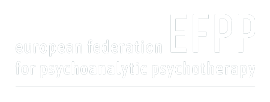

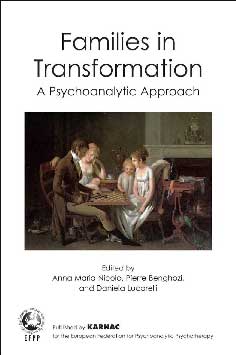
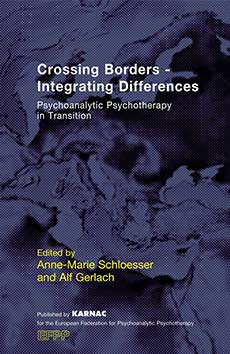
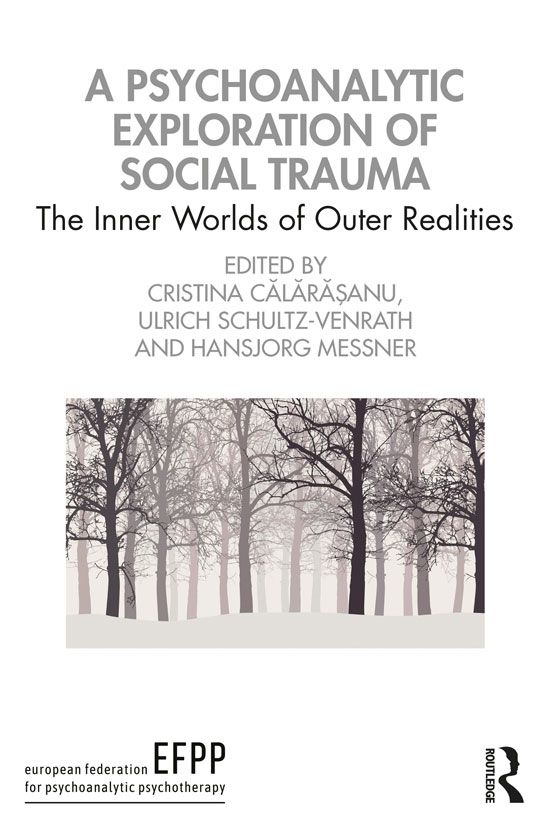


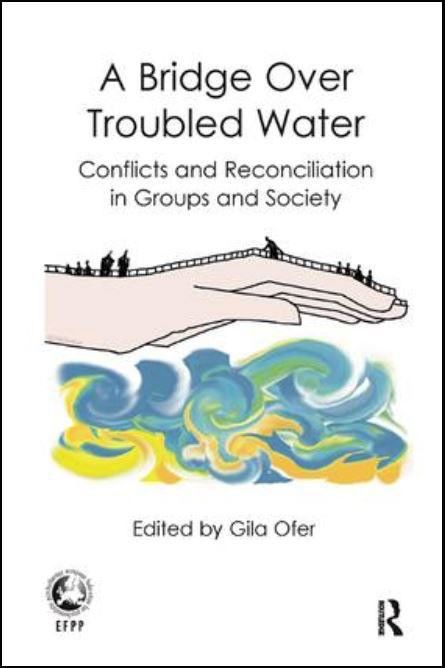
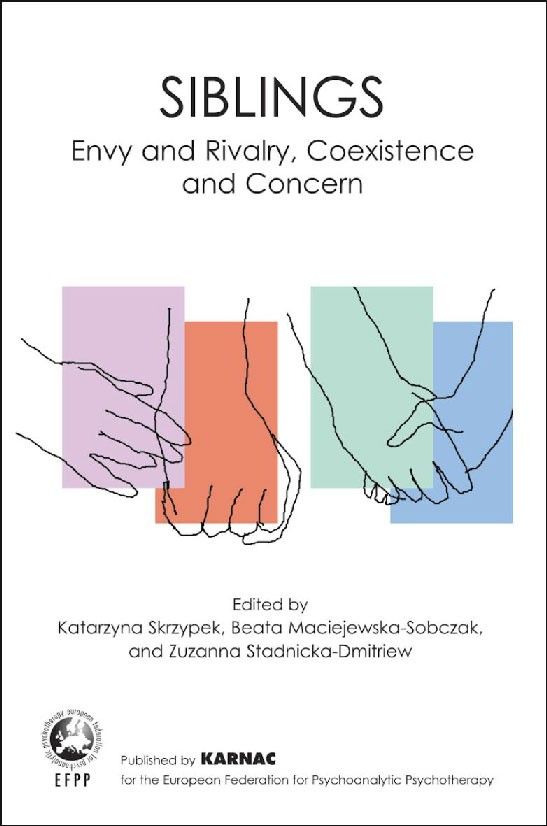
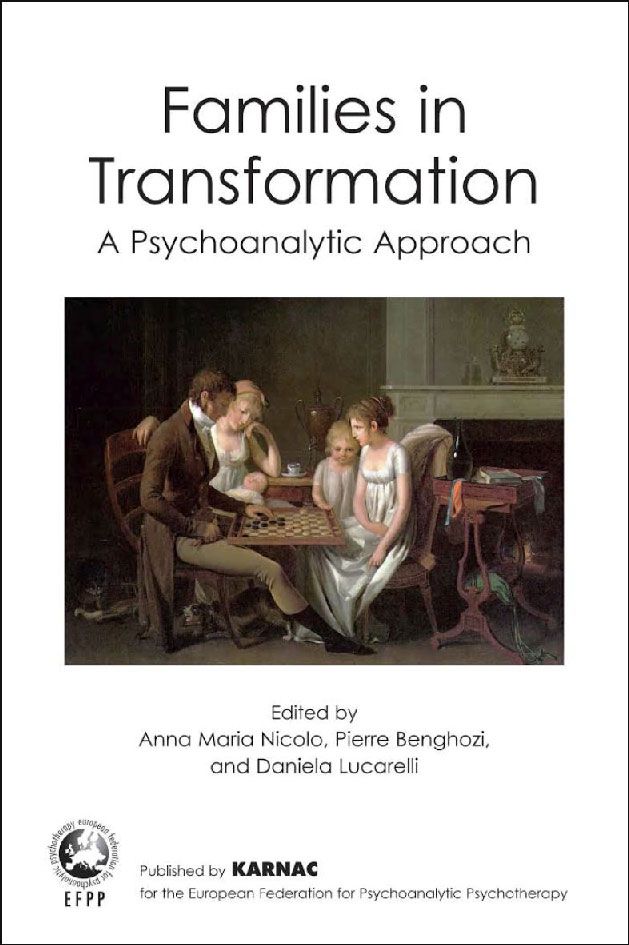
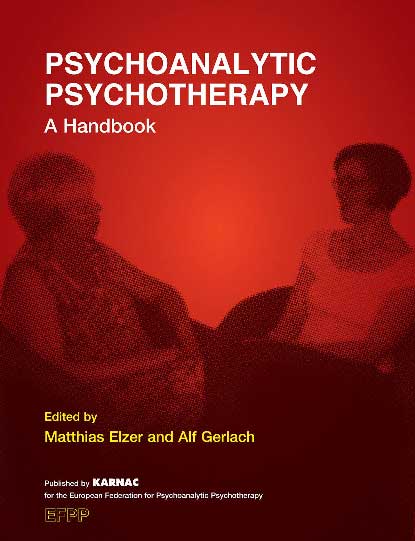
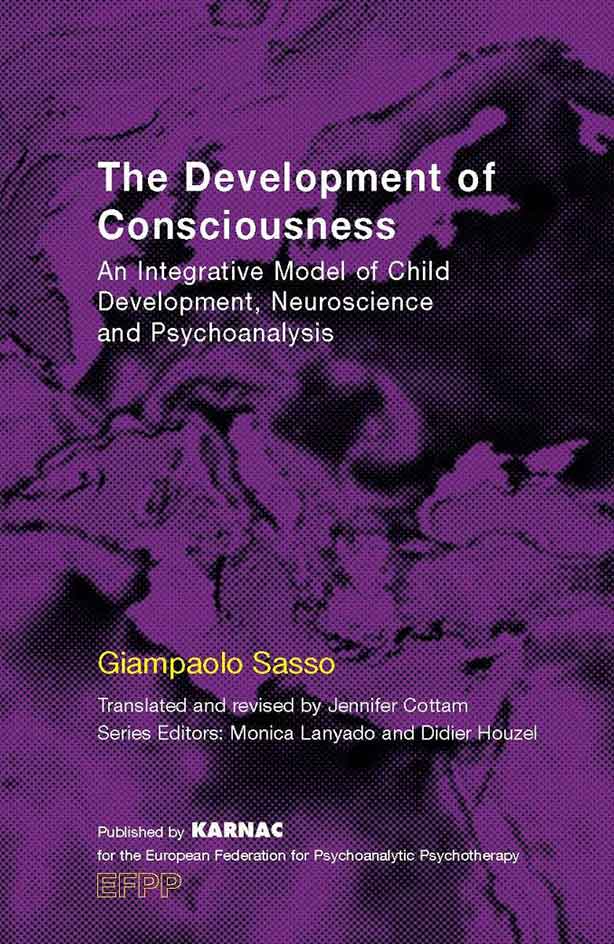
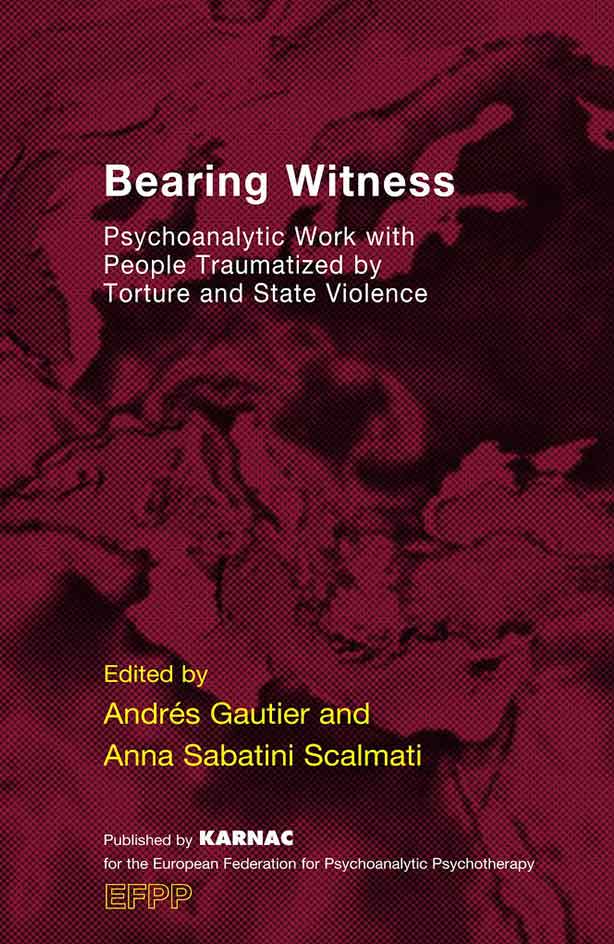
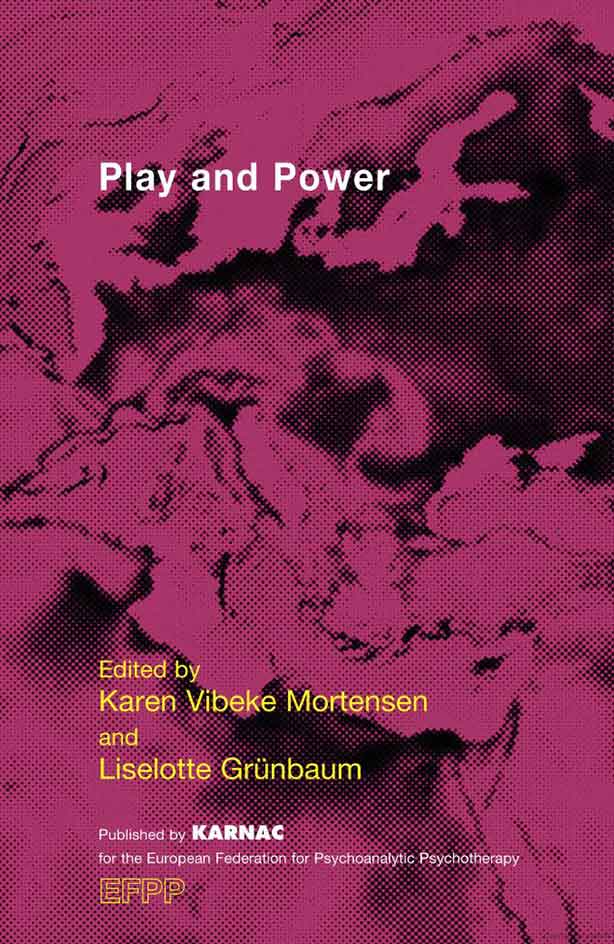
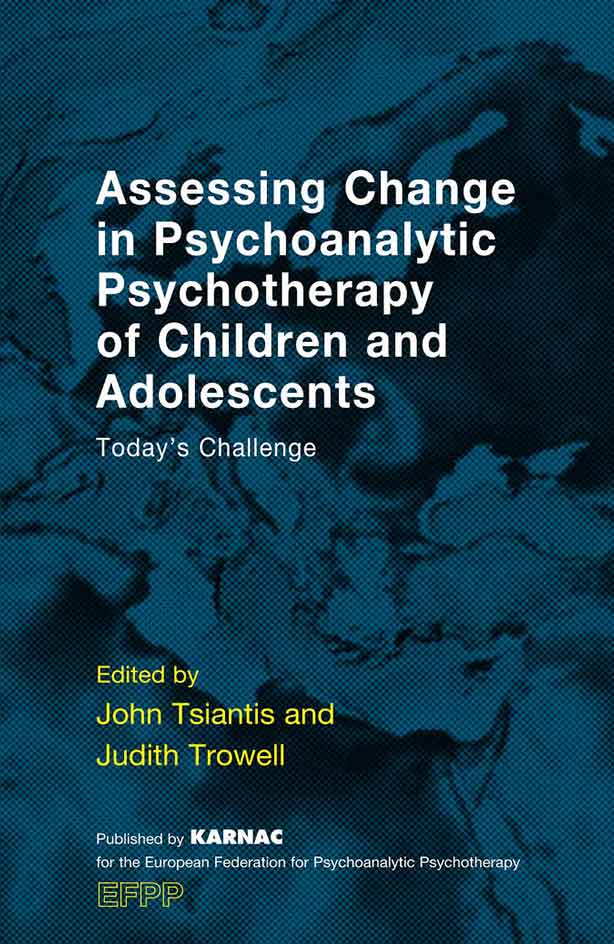

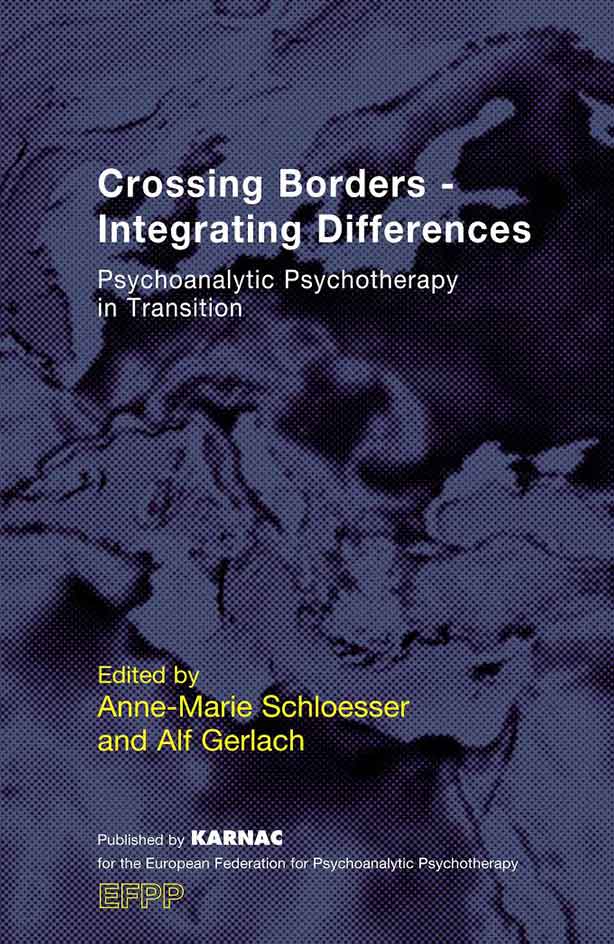
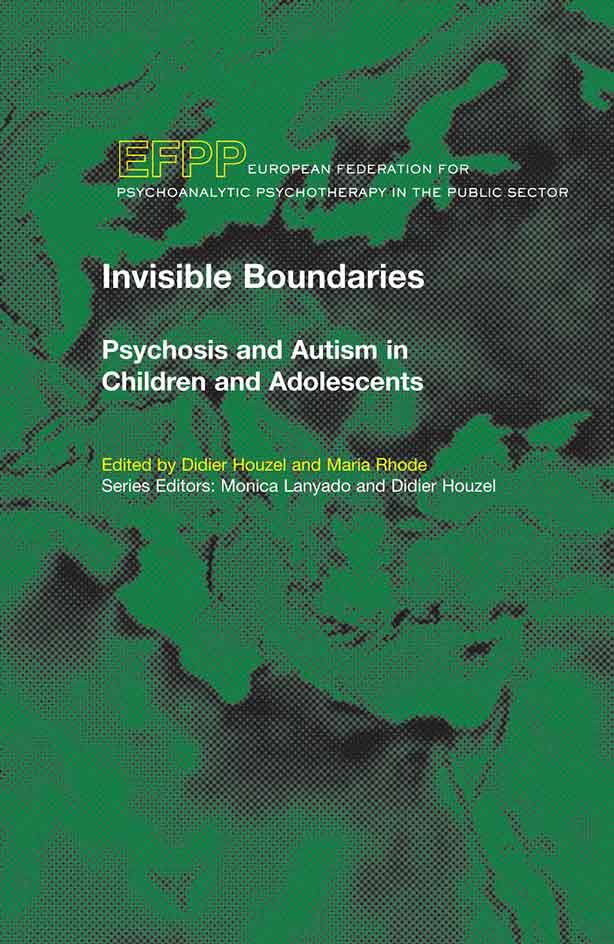
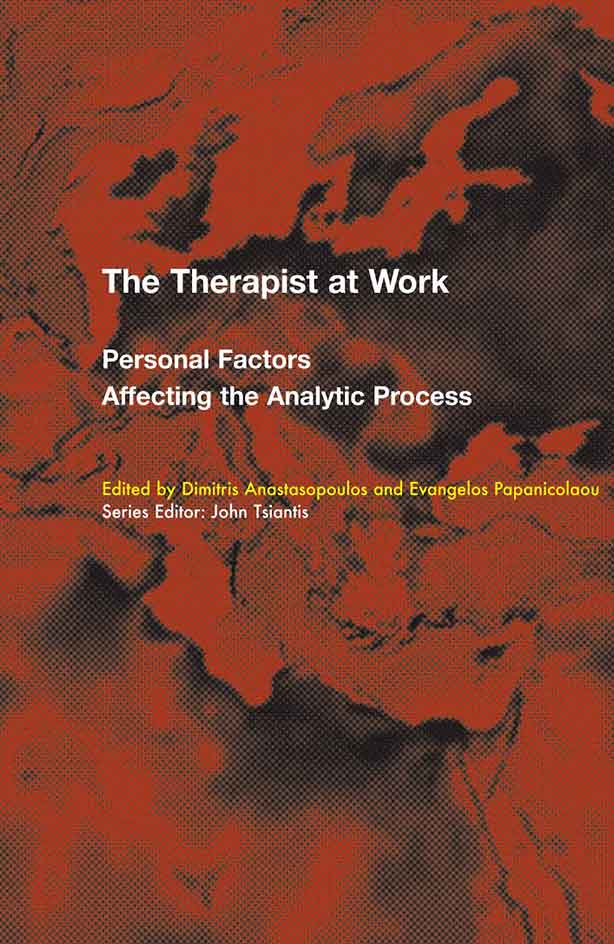
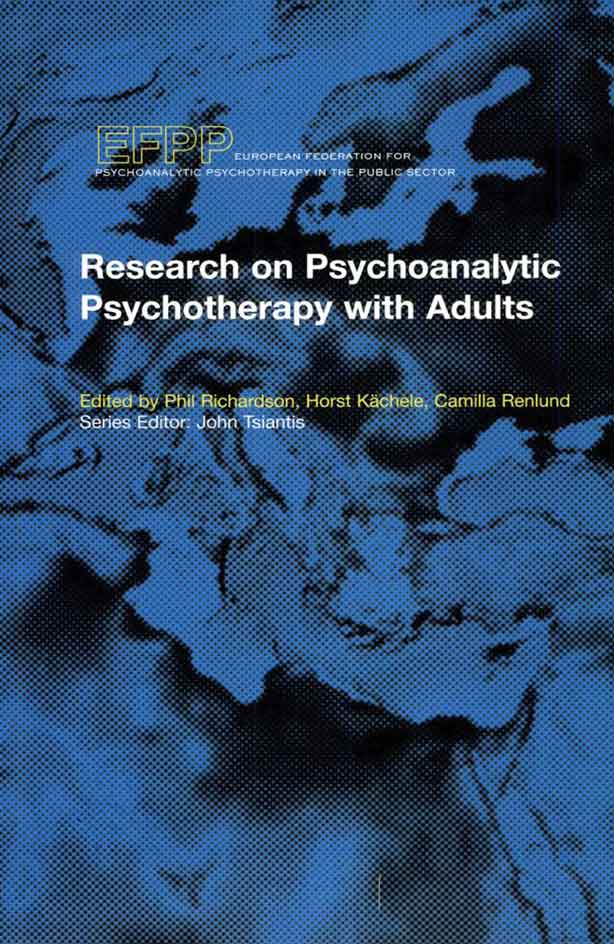
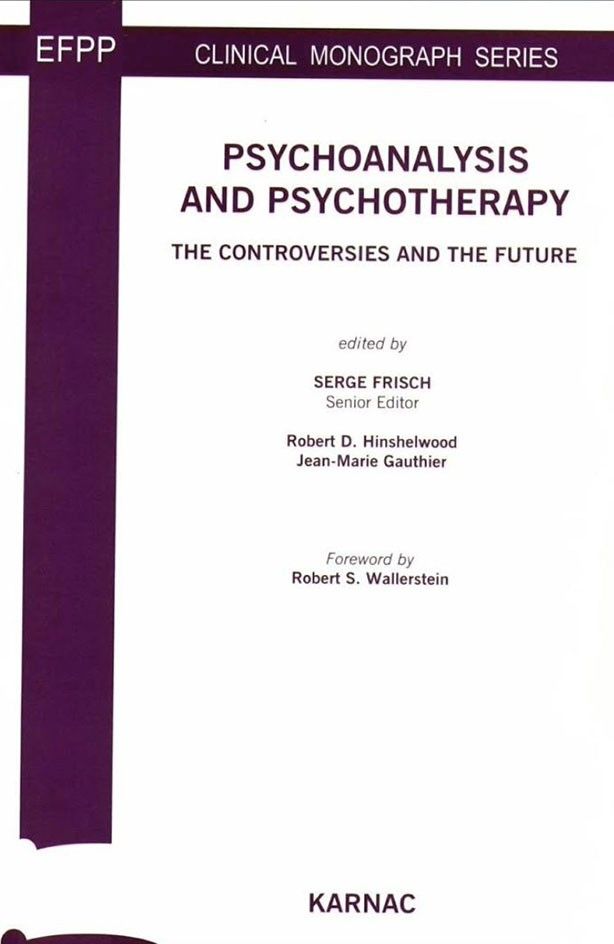
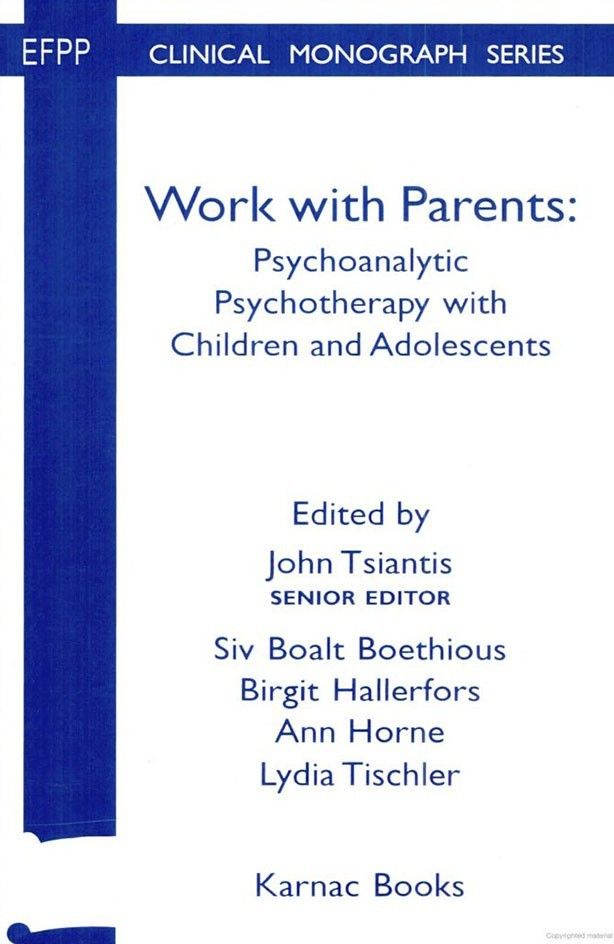






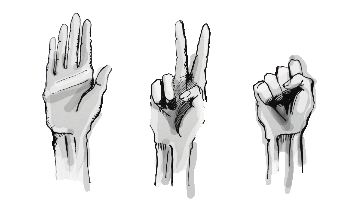 Poland on the Couch is an initiative started by group analysts (Institute of Group Analysis Rasztów) aimed at building a safe space for conversation – the basis of social life. Its roots date back to 2014, when an international conference Poland on the Couch – about the strength and fragility of the individual in the contemporary global world seen from the perspective of social and psychodynamic psychology was held. During the conference, analysts together with representatives of the world of science and the media discussed what was happening in Polish society.
Poland on the Couch is an initiative started by group analysts (Institute of Group Analysis Rasztów) aimed at building a safe space for conversation – the basis of social life. Its roots date back to 2014, when an international conference Poland on the Couch – about the strength and fragility of the individual in the contemporary global world seen from the perspective of social and psychodynamic psychology was held. During the conference, analysts together with representatives of the world of science and the media discussed what was happening in Polish society.